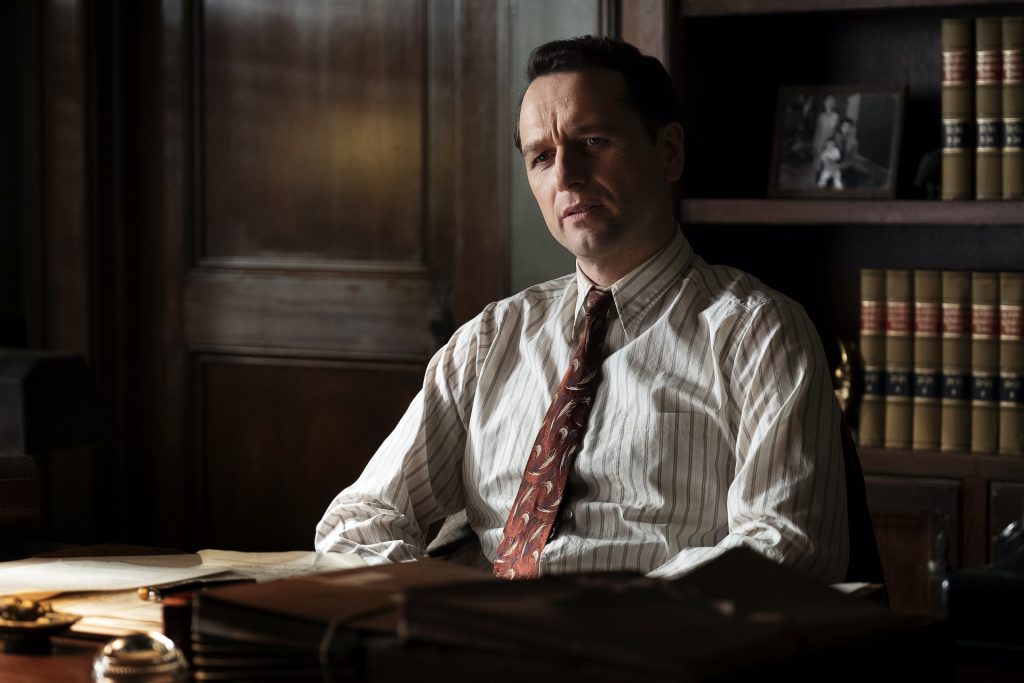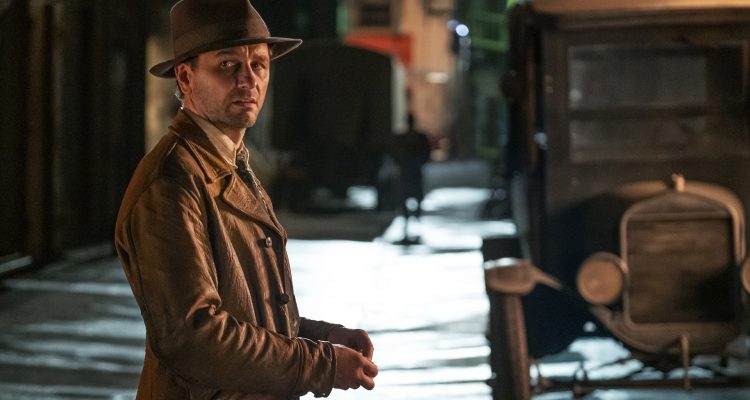Following his Emmy-award winning turn as a KGB spy in FX’s The Americans, Matthew Rhys has found himself on the other-side of the law with his masterful turn as the fictional private eye turned attorney Perry Mason.
Based on the books by Erle Stanley Gardner, the new HBO series finds Perry Mason as a pauperized private investigator hired by attorney E.B. Jonathan, played brilliantly by fellow nominee and three-time Emmy winner John Lithgow, to look into a child kidnapping case. However, Jonathan’s sudden death leaves Mason to trial the case alone with familiar characters from the original series.
Rhys entered the Emmy conversation with a searing performance that sees Mason grow from a drunk, profanity-laden investigator, whose vanity cracks under the weight of a case that strikes close to his heart. Rhys electrifies in the role, and also served as a producer on the series, collaborating with director Tim Van Patten to ensure the series bounced with life and authenticity.
“The script provided us with a lot of obvious clues, but building Perry from the boots-up was a real collaboration,” Rhys shares. “I felt I had real ownership of the character, which is so rarely the case.”
Rhys spoke with Awards Focus about exploring the origins of Perry Mason, collaborating with various departments on Mason’s look, performing alongside fellow nominee John Lithgow, and what he’s looking forward to in Season two.
Awards Focus: Perry’s war history informs a lot of his development. How did your concept of Perry Mason, as a character, come about? Did you have any preconceived notions?
Matthew Rhys: That was something that Ron (Fitzgerald) and Rolin (Jones) came up with. They wanted Perry Mason to have his bases loaded, in their words, which I thought was a very clever way of giving him a backstory with a lot of context.
Perry experienced a great travesty of justice in that moment in World War One, and it kind of sets him up for life, whereby he can’t walk away from an unjust situation. Because he’s been on the butt end of injustice. He’s been railroaded himself. So to make the choice of him becoming a lawyer who’s grounded in that moment in World War One was very astute.
AF: You’ve joked about how long it takes to become a lawyer. But the methodical pacing really works with the show. How far along were they in plotting out the season when you started getting involved? Did you know it would be towards the end of the season?
Rhys: Yeah, they kind of hinted at it. I thought they were joking for a while that they were going to have three episodes of Perry Mason as a lawyer. But in retrospect, they were absolutely right. Because you’re taken along on this journey going “Wait, how’s this gonna play out? What’s going to happen?”
I love that they took it down to the wire and let it sit for five episodes while people wondered “When or how is he gonna become a lawyer?” Back in the day, taking the Bar was, as we saw, a swifter experience in California. But I thought it gave the right kind of beat. It really accelerates those last three episodes where he has to learn how to become a courtroom trial lawyer in real time.
AF: It’s not a smooth process for Perry, but there’s a certain beauty in watching his journey as he tries to navigate becoming a trial lawyer.
Rhys: That was part of the attraction for me as well. When they first said that they wanted to remake Perry Mason, I thought, “How would you remake Perry Mason?” But then they explained that they wanted to do the origin story of how he became a trial lawyer, which I thought was great. He’s far from being smooth, which gives him more variability and makes him more interesting. As an actor, I was able to experience the same learning curve that Perry would have in those courtroom scenes.
AF: I imagine that partnering with Tim Van Patten was quite the draw as well. What was it like working with him as a director?
Rhys: You often see younger directors with more to prove, who talk more, and who constantly hit you with notes. But Tim is very experienced and has already proven himself. He’s able to find the right crew and cast, then he subtly orchestrates in a very organic way.
Most importantly, he always asks “What do you think?” He’s not interested in stamping things in. He tries to create a pure collaborative process. He ensures that everyone can do their job to the best of their ability, always asks for opinions, and encourages a real team effort. I was amazed by that. But what you don’t realize is that he’s a bit like Mickey Mouse in Fantasia, though less prominent. He’s at the back, orchestrating the alchemy while allowing it to happen gently and giving everyone their own say. I think that ability comes with great talent and experience.

AF: That’s an incredible compliment to Tim’s skill as a director. What was it like working with the wardrobe team to craft Perry’s look?
Rhys: This has certainly been my most collaborative job. It was a real pleasure and privilege to act as a producer on this. I was able to meet these people early on and see the vision they had in mind. And it really helped us find the right people.
Tim and I spoke a lot about texture. We wanted people to know how things felt to a certain degree. When I first spoke to Graham Potter, she thought that one of the most important things on this project was to ensure that the costumes looked real and lived-in. That quality was very important to me, so that’s when I knew she was right for the job. As we began working together, she would bring in these incredibly elaborate mood boards of images from the time period. Then we would pick out the images we thought were interesting. And this was important, since Ron and Rolin had set a precedent in the script as to how Perry looked since he was basically buying clothes from corpses.
During the Depression, clothes meant something very different to people. No one normally bought clothes. So those were immediately strong indications of who Perry was and the family he came from. And the script provided us with a lot of obvious clues. But building him from the boots-up was a real collaboration. I felt like I had real ownership of the character, like I’d actually built it with her, which is so rarely the case.
AF: I had the chance to speak with John Lithgow, and he mentioned a scene in the show where he runs his fingers through your hair. It seems like a pivotal moment and really reinforces everything you need to know about the relationship between those two characters. What was your perspective on that scene? And what was it like working with John?
Rhys: When working with John Lithgow, you can’t quite do him justice, and you don’t know where to begin. There’s so much to unfold in that man. There’s a reason he’s been nominated thirteen times for an Emmy and has won six.
He comes to the seat with a wealth of experience. Not just acting experience, but life and art experience. He brings truckloads with him. Actors can get sycophantic about each other at times, but working with him really was kind of a revelation. I remember that particular scene when he ran his fingers through my hair. It’s notable because at the time he’s talking about how I came to see him as a young boy. At that moment you really get to see his character at work.
I remember thinking, “He nailed it.” He just perfectly nailed an innocent moment, which I thought spoke volumes. And that is so indicative of who he is as a person and as an actor. He’s kind of economic in what he does, but when he does do something it’s so rich and laden with nuance. I learned a lot from him.
AF: With the second season focusing on a different case, you’ll be working with a lot of new actors. What’s it like to start a new season with a fresh cast?
Rhys: It’s a luxury to start a new season with a new group of people. You sort of get to start over again.
Of course, it’s scary since you have the pressure of replicating the alchemy of the first season. But at the same time, it’s like a fresh canvas. So that in itself is very exciting.


